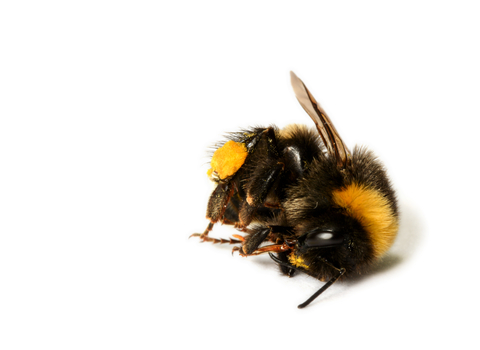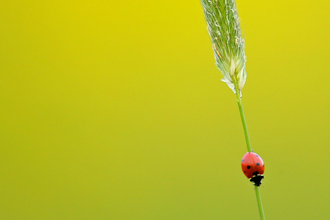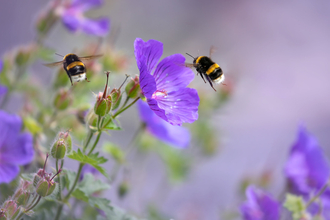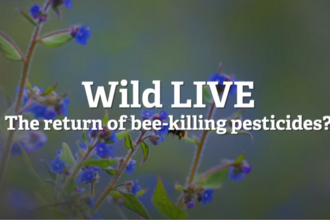No place for banned chemicals in a wilder future
Latest update: Great news! The UK Government announced on 23 January 2025: Pesticide emergency authorisation denied for 2025 to protect bees - GOV.UK
Joan Edwards, Director of Policy and Public Affairs at The Wildlife Trusts, said: “For years, experts and more than 300,000 wildlife supporters have called for the ban against neonicotinoids to be upheld and The Wildlife Trusts are delighted with this decision. There is simply no place in modern sustainable agriculture for highly toxic pesticides that kill bees and poison soils and rivers. Neonicotinoids were originally banned in the UK in 2017 but were granted repeat authorisations for use, despite explicit guidance against their approval. Many farmers across England have already turned their backs on these devastating chemicals. It’s time for British Sugar to take greater responsibility, and pay growers a fair price for producing beets without neonicotinoids. The focus must now be on a complete, sustainable transition away from a reliance on the use of neonicotinoids not just in agriculture, but also in pet flea treatments. This is a key source of chemical pollution in our waterways, with 10% of UK rivers found to contain toxic neonicotinoid chemicals.”
Neonicotinoids are a group of pesticides that are highly harmful to the environment and wildlife. They are particularly dangerous for bees. Even a tiny amount of these chemicals can kill huge numbers.
A miniscule trace can disrupt a bee’s ability to navigate and reproduce, with long-lasting consequences for their survival. When neonicotinoids are washed into streams and rivers they are extremely toxic to aquatic invertebrates and further pollute our already struggling waterways.
Due to their environmental impact, neonicotinoids were banned for outdoor use in the UK in 2018. Yet in 2024, for the fourth year, the UK Government approved so-called ‘emergency authorisations’ made by the company British Sugar for the use of the highly damaging neonicotinoid, thiamethoxam, on sugar beet.
The UK Government must uphold its commitments to protect nature, reduce the impact of pesticides, and champion nature-friendly farming.
Emergency authorisations
The decisions to grant emergency authorisations in the past have been made to protect sugar beet crops from the impact of Virus Yellows. However, in all three years the authorisation has been granted, the Government’s decision to allow the use of thiamethoxam on sugar beet went against their own expert advice. Both the Health and Safety Executive and the Expert Committee on Pesticides advised against authorising neonicotinoids, even in cases where the potential impact from Virus Yellows was high, as the risks to the environment far outweigh any benefits to the sugar beet industry.
These decisions also ignore the 100,000+ members of the public who appealed to the then-Prime Minister in 2021 to reverse the first 'emergency' authorisation, undermine farmers who are working with nature to reduce their pesticide use, and runs a bulldozer through the Government's legally-binding commitment to halt species decline by 2030.
Neonicotinoids FAQ's
Find answers to some of the most frequently asked questions below.
What's the latest news?
The pesticide emergency authorisation was denied for 2025 - to protect bees! An emergency authorisation for Cruiser SB, a neonicotinoid pesticide, will not be granted by UK Government for 2025.
Read our reaction to the 2024 decision to allow thiamethoxam last year for the fourth year in a row here.
What happened last year?
On the 23rd January 2023 following lobbying from the sugar industry, the UK Government announced its decision to grant an “emergency authorisation” for the use of a product containing the banned neonicotinoid thiamethoxam to treat sugar beet seeds in 2023. This follows the approval of similar applications for growing seasons in 2021 and 2022, where the use of banned neonicotinoid pesticides was permitted across more than 91,000 hectares of countryside in England.
These chemicals are known to have disastrous effects on UK wildlife. The Wildlife Trusts have consistently opposed a derogation due to the known environmental harms it causes and has criticised the flawed - and legally unsustainable - decision-making process the Government has used.
Evidence shows at least 50% of insects species have been lost since 1970, and the shocking reality that 41% of the Earth's remaining insect species are now 'threatened with extinction’. Farmers should not have to choose between farming and nature. We continue to call for proper, long term support for farmers to adopt non-chemical alternatives which are proven to support nature.
I thought neonicotinoids were banned? Why has this happened?
Over the past three years (2021, 2022, and 2023) the UK Government has granted emergency authorisation of this banned product.
The company British Sugar has requested ‘emergency’ authorisation in an effort to control aphid populations in sugar beet. This is because aphids are known to spread a disease called Beet Yellows Virus (BYV), which has the potential to reduce sugar beet yields significantly if left unchecked. Previous applications for the emergency use have been made by British Sugar who have pushed for the authorisation of the pesticide seed treatment to deal with “unprecedented” peach potato aphid Myzus persicae infestations (which carry Beets Yellows Virus) seen in 2020.
Under the emergency authorisation process, the application is considered by the Health & Safety Executive (HSE) and the Expert Committee on Pesticides (ECP). In all three years, the Government’s decision to allow the use of thiamethoxam on sugar beet went against the expert advice provided to the Government by both the HSE and ECP which advised that the risks to wildlife were too high, and that thiamethoxam should not be used even if the national incidence of Beet Yellows Virus was forecast to be high.
I thought neonicotinoids were banned? Why has this happened four years in a row?
In early January 2021, the Government announced an emergency lifting of restrictions of the highly damaging neonicotinoid, thiamethoxam. The Secretary of State, George Eustice, made the decision in response to requests from the sugar industry because of the potential danger posed from beet yellows virus, which is spread by aphids. The UK Government made the same decision in 2022, 2023 and now in 2024 despite being explicitly advised not to by their top health and safety and pesticide experts.
But the Government says this is just temporary and for use in an emergency, so what’s the problem?
The Wildlife Trusts are concerned that the powers granted under the legislation are being abused to authorise the regular and routine use of banned chemicals. This is in direct contradiction of the 2018 ban of neonicotinoids, jeopardises the Government's legally binding targets set out in the Environment Act, and undermines promises made internationally to reduce the impact of pesticides.
The sugar industry has requested an ‘emergency authorisation’ for the use of the banned chemical thiamethoxam four years in a row, despite saying they would only need it for a maximum of three years. However, the legislation which underpins this process clearly states that the authorisation must only be used to allow the limited and controlled use of a chemical for a “period not exceeding 120 days”.
Each year, more research is published on the devastating impacts of neonicotinoids, including the chronic non-lethal effects of these chemicals which can persist for years in the environment. It’s becoming clear that this ‘temporary’ measure will have long-lasting effects on our pollinators.
Increasingly, the UK is experiencing milder and wetter winters, so the issue of virus in sugar beets will likely only increase in future years. This is why it is critical to support farmers to transition away from harmful chemicals that threaten the future of our farming and natural systems. Continuing short-term options to tackle the effects on crops from pest impacts which will only get worse with climate change is short-sighted, and does not help farmers take a long-term, integrated approach to pest management.
The neonic won’t be used unless certain conditions are met. Why should we be worried?
Crucially, the expert scientific advice given to the Government stated the environmental harms would outweigh potential economic benefits, even when the strict conditions in the application were taken into account. The advice was clear that the conditions attached to these authorisations are not enough to mitigate the loss to bees.
The authorisations granted in recent years did include conditions which were designed to protect nature, such as a threshold limit for use and a requirement to prevent pathways for the chemical to reach vulnerable insects like bees. However, the model used to calculate the threshold is flawed, and the so called ‘protections’ for bees in reality equate to more pesticides and the removal of important wildflowers.
Don’t farmers need to use this chemical?
There are alternatives to using these hugely harmful chemicals, such as adopting Integrated Pest Management approaches, and they are already being used by many sugar beet farmers in the UK who do not want to use this neonicotinoid.
In 2022, almost a third of sugar beet farmers in England chose not to use these toxic pesticides despite an authorisation allowing their use. It is entirely possible to produce food in a way that helps rather than harms nature – farmers know that the use of this chemical is not a long term solution.
Farmers need support to build resilient and sustainable farming practices. But rather than supporting these farmers, the industry has applied for further use of thiamethoxam. If successful this year, nature-friendly farmers will have to compete with those who use thiamethoxam-treated seed, actively discouraging non-chemical alternatives.
Rather than repeat authorisations for toxic chemicals, The Wildlife Trusts want to see the sugar industry and UK Government offer more support to transition away from harmful pesticides that threaten the future of our farming and natural systems. Farmers should not have to choose between pesticides and pollinators.
What is an Integrated Pest Management System?
Integrated Pest Management (IPM) is an approach to managing pests, diseases or weeds in which chemical pesticides are used only as a last resort, if at all. Many IPM practices that replace toxic chemical applications are good for wildlife because they focus on creating healthy soils and whole-farm ecology rather than just field margins or features.
If we don’t grow sugar in the UK, won’t we just import more sugar from abroad?
The Wildlife Trusts believe our society shouldn’t have to make a choice between environmental harms at home or overseas, and it would be hugely damaging to nature if regulations around chemicals resorted to a “race to the bottom”. We understand concerns that halting pesticide use could lead to the UK having to import more sugar from abroad, where environmental regulations for farming may be lower than in the UK.
However, farmers have shown that we can produce sugar in the UK to higher environmental standards without the need for banned chemicals.
We want more farming in the UK work for nature, not against it. This means ensuring that UK farmers are not undermined by food produced to lower standards overseas. The Wildlife Trusts also want to see strong trade standards which assess the full environmental impacts of imports so the UK is not offsetting our environmental impacts abroad, and ensures UK farmers are supported to market food produced in nature-friendly farm systems.
Isn’t sugar beet a non-flowering crop? How can it affect bees?
The Government has stated that authorised applications will have to comply to strict conditions to ensure that wildlife is not harmed, but this assertion does not stand up to scrutiny:
- The authorisation allows “seed-dressing” of sugar beet crops with neonicotinoid pesticides, a method of application that results in only 5% of the pesticide going where it is targeted, in the crop[i]. The rest ends up accumulating in the soil, from where it can be absorbed by the roots of wildflowers and hedgerow plants, with fatal impacts on any pollinators that visit them.
- Furthermore, the chemical can leach into rivers and streams where it could harm over 3,800 invertebrate species, which spend at least part of their life cycle in freshwater.
References
[i] 0 Sur, R. & Stork, A. (2003) Uptake, translocation and metabolism of imidacloprid in plants. Bulletin of Insectology, 56, 35–40
What do The Wildlife Trusts think about this?
The Wildlife Trusts are shocked that this decision has been taken for a second year in a row, despite further evidence being released this year demonstrating the terrible impacts of Thiamethoxam on bees. We strongly oppose this decision, and will be urging the Government to listen to their own appointed experts and reverse the emergency authorisation.
In Insect Declines and Why They Matter (2019), a report published by an alliance of Wildlife Trusts, evidence points to the loss of at least 50% of our insects since 1970, with a further 41% of the Earth's remaining five million insect species now 'threatened with extinction’. With a third of our food crops pollinated by insects, and as many as 87% of our plants pollinated by animals (and in the majority by insects) there is a lot to lose. Much of our wildlife - be it birds, bats, reptiles, amphibians, small mammals or fish - rely on insects for food. Without insects we face the collapse of our natural world.
The Wildlife Trusts want a wilder future, where the value of our insects is respected and where insect populations are healthy and more abundant than today. We want farmers to be supported to adopt non-chemical alternatives so that agriculture supports nature, rather than destroy it.
Are other countries are doing the same?
Since the EU-wide ban on neonicotinoid pesticides, EU countries have issued at least 67 different “emergency authorisations” for outdoor use of these chemicals[i]. These authorisations have often been granted repeatedly and without any apparent evidence of an unusual or ‘emergency’ situation as justification. The Wildlife Trusts are concerned that the UK could follow the same trend, leading to a backward slide in our environmental standards.
In Europe, the European Commission has referred the use of these emergency powers to the EFSA (European Food Safety Authority) for review, with the likelihood that they will restrict or potentially remove these powers altogether in the future for member countries of the European Union. This would not apply to the UK, as it is no longer a member of the European Union.
References
[i] https://unearthed.greenpeace.org/2020/07/08/bees-neonicotinoids-bayer-syngenta-eu-ban-loophole/
Should I boycott sugar producers?
The Wildlife Trusts do not actively ask people to boycott sugar producers or sugar providers. But that doesn’t mean that consumers can’t make a difference!
In years when the banned neonicotinoid, thiamethoxam, is granted an authorisation for use on sugar beet any product that contains sugar grown in the UK will contain neonicotinoid-treated sugar. This is because there is no way of separating the processing of sugar beet grown with and without neonicotinoid-treated seed, in England. This means that even when farmers try to grow sugar beet without the use of neonicotinoids, they are left with no routes to market their neonic-free seed – which they could expect a premium for.
This is not a technological issue, as it is frequently supported across European countries which are able to process and market organic sugar from sugar beet crops. In fact, in the EU organic sugar beet production is rapidly increasing showing that it is possible to produce sugar beet without neonicotinoids. A significant part of this shift has been driven by the EU’s stance on pesticides and the European Court of Justice’s recent ruling on the suitability of emergency authorisations for neonicotinoids.
Where can I see more evidence of the risks?
In Insect Declines and Why They Matter (2019), a report published by an alliance of Wildlife Trusts, evidence points to the loss of at least 50% of our insects since 1970, with a further 41% of the Earth's remaining five million insect species now 'threatened with extinction’. With a third of our food crops pollinated by insects, and as many as 87% of our plants pollinated by animals (and in the majority by insects) there is a lot to lose. Much of our wildlife - be it birds, bats, reptiles, amphibians, small mammals or fish - rely on insects for food. Without insects we face the collapse of our natural world.
The Wildlife Trusts want a wilder future, where the value of our insects is respected and where insect populations are healthy and more abundant than today. We want farmers to be supported to adopt non-chemical alternatives so that agriculture supports nature, rather than destroy it.







